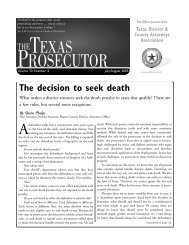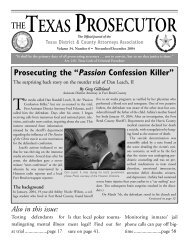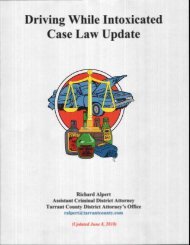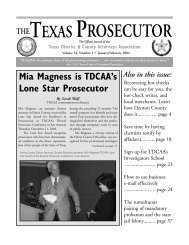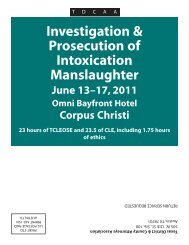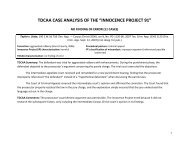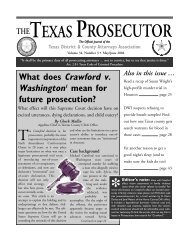Driving While Intoxicated Case Law Update - Texas District ...
Driving While Intoxicated Case Law Update - Texas District ...
Driving While Intoxicated Case Law Update - Texas District ...
Create successful ePaper yourself
Turn your PDF publications into a flip-book with our unique Google optimized e-Paper software.
8. SEARCH WARRANT AFFIDAVIT CONTAINING MULTIPLE<br />
ABBREVIATIONS THAT WERE NOT EXPLAINED = NOT FATAL<br />
Hooan v. State, 329 S.W.3d 90 (Tex.App.-Fort Worth 2010).<br />
Attacked the warrant affidavit on the basis that it contained "conclusory and nonsensical<br />
sfafemenfs." lt described driving path of "IMP" without saying what IMP is or that defendant was<br />
driving lMP. lt containsterms HGN, WAT and OLS without defining fhose acronyms or explaining<br />
significance of number of clues. Does not state officer is qualified to conduct FSf's or that he has<br />
experience in DWlcases. Trial Court denied MTS. ln rejecting fhese arguments, the Courtfound<br />
that there was sufficient evidence to tie defendant to lMP. The description of the clues on the<br />
FSf's and other facts were sufficient to show PC. Although it could have been more complete<br />
about officer's experience in DWI cases, such information is not required ta make affidavit<br />
adequate. CifesSwearingen v. State, 143 S.W.3d 808 (Tex.Crim.App.2004). When reviewing a<br />
magistrate's decision fo issue a warrant, we apply a highly deferential standard in keeping with<br />
constitutional preference for a warrant. "Even in close cases, we give great deference to a<br />
magistrate's determination of PC to encourage police officers fo use the warranf process rather<br />
than making a warranfless search and later attempting to justify their actions by invoking some<br />
exception to the warrant requirement."<br />
9. THE RELIABILITY OF THE FST'S DESCRIBED IN THE SEARCH<br />
WARRANT AFFIDAVIT ARE ATTACKED = NOT FATAL<br />
Folev v. State, 327 S.W.3d 907 (Tex.App.)-Corpus Christi-Edinburg 2010).<br />
ln attacking the affidavit, the defendant contends that the FSf's mentioned were not credibte<br />
saurce of information regarding his intoxication because of his age being over 65. Court of<br />
Appeal's response is fo assume that fhe FSfb described were not good indicators for this<br />
defendant, butfound thatthere were enough other independent indicators of intoxication to sustain<br />
the warrant.<br />
10.<br />
FA)(ED WARRANT WHERE OATH WAS ADMINISTERED BY<br />
MAGISTRATE<br />
TO AFFIANT OVER THE PHONE<br />
(a) NOT FATAL<br />
Swenson v. State,2010WL924124 (Tex.App.- Dallas 2A1q.<br />
This involved a faxed warrant and the rssue was that the officer swore to the oath over the phone<br />
and then faxed the warrant. At the hearing the officer testified he was never told that procedure<br />
was incorrect. The Trial Court denied the motion finding that the warrant was properly sworn to<br />
and the "good faith" exception applied. The Court does not address fhe rssue of whether an<br />
officer's telephonic oath is sufficient as it finds the "good faith exception" applies.<br />
1_ 03



